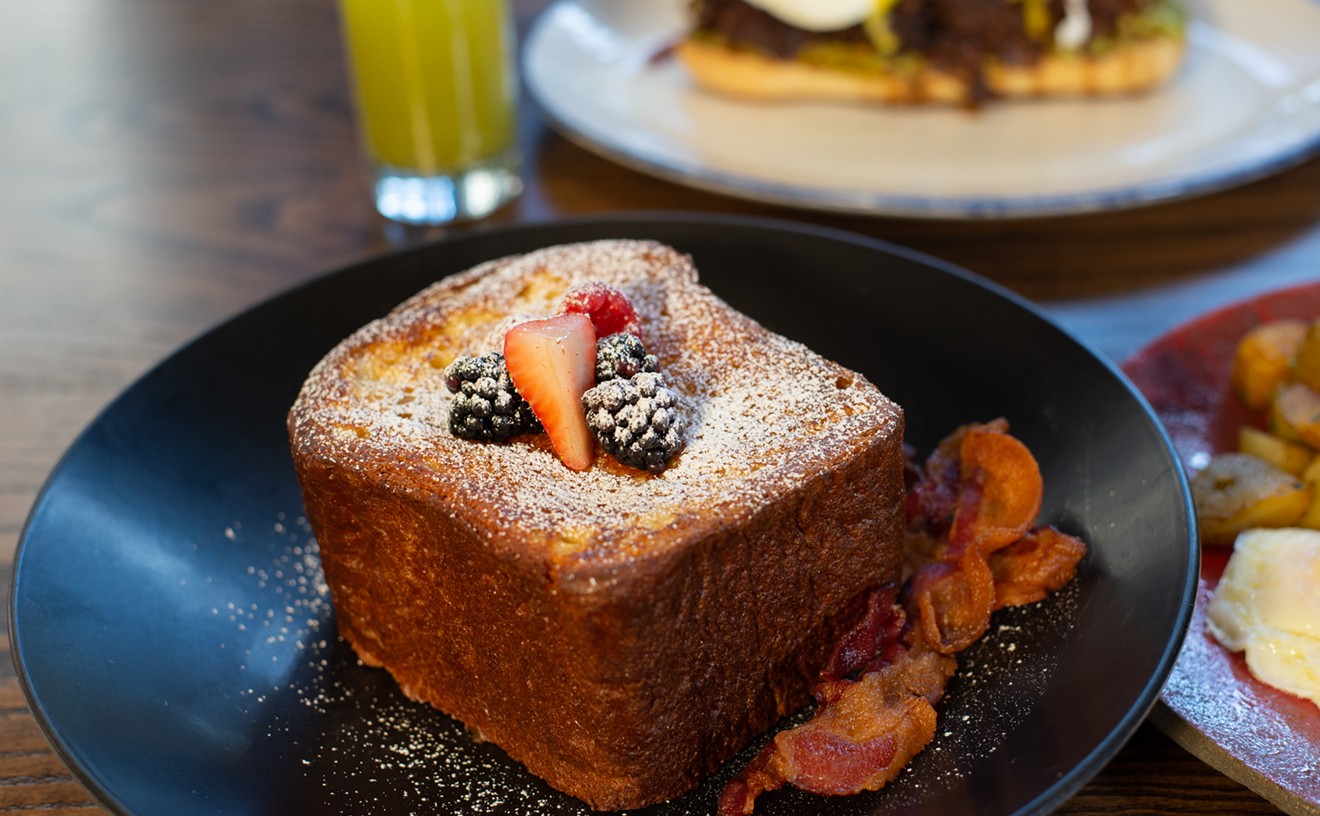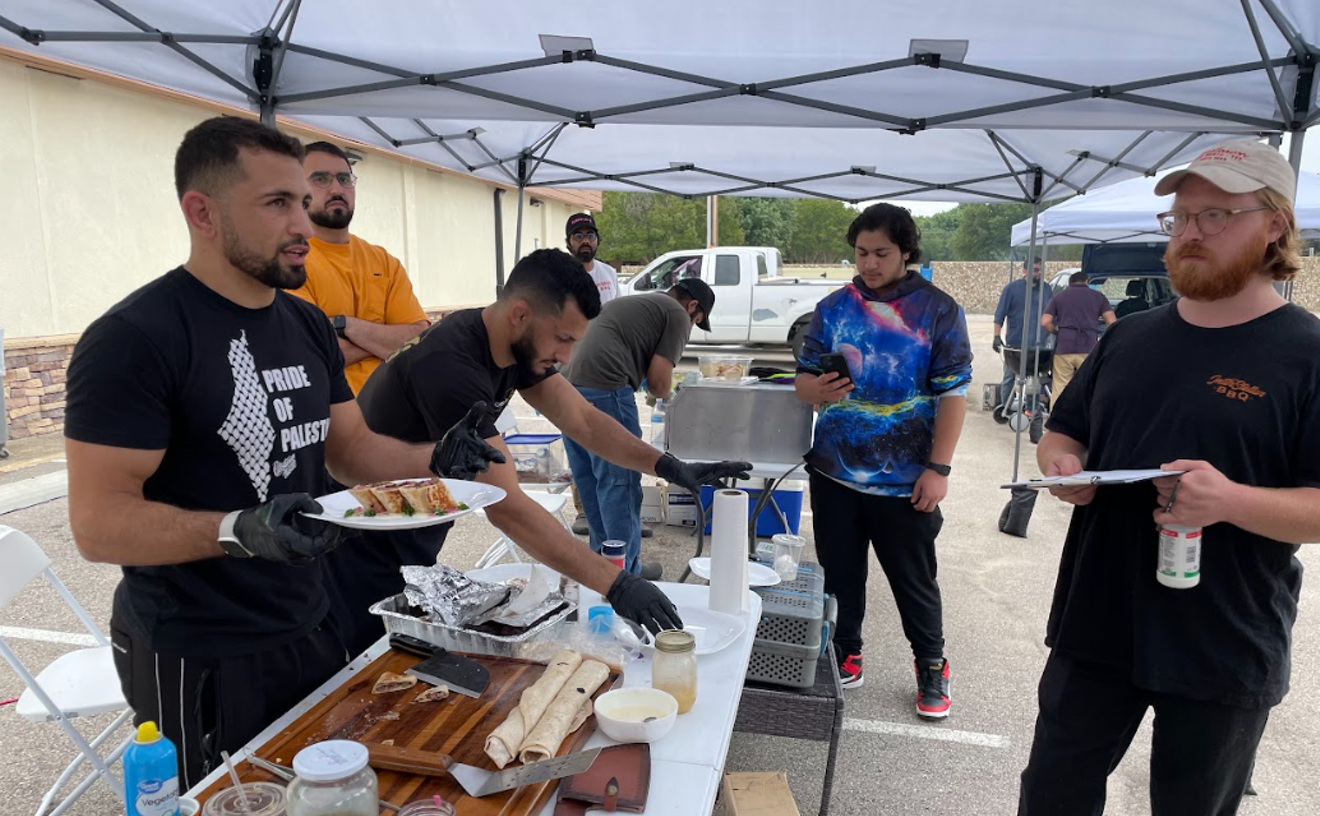In the restaurant industry, it is almost always the executive chefs who get all the glory. When the four-star reviews come in and the back-patting goes around, nobody thinks about the sous chef. But it is the hard-working sous chefs, backed by a hard-working army of line cooks, that are the real backbone of the industry. At The Blind Butcher, sous chef Brian Bell has experienced the best (and worst) of both worlds.
After stints in The Hamptons, Miami, and at Kent Rathbun's Abacus, Bell has settled into the role of Best Supporting Sausagemaker next to executive chef Oliver Sitrin. Since opening, Bell and Sitrin have been able to introduce Dallas to the occasionally weird, always delicious world of hand-cranked sausages. I sat down to talk with Bell about his culinary trajectory, how to tell when you're more than just a line cook, and what the hell it actually means to run one of the city's busiest kitchens.
You've been in the restaurant industry for a long time now, how did you first get started?
I grew up in Sherman, Texas, and my uncle had a steakhouse there. I started working there when I was 14 as a busboy, and on a Friday night, they lost a grill cook and said, "You just got promoted." I was just learning the basics from the old guys who had been doing it their whole lives, and then I just kind of bounced around to different bars and pubs. That's where I met one of my friends who had just gotten back from New England Culinary Institute, where he had gone for a month or so in between jobs. He talked me into it. I was just like well shit, might as well go to school and make a living doing this.
Where did you go after culinary school?
I went to The Hamptons for almost a year, and then I had to go back to school for another semester, then I came to Dallas. I started working at Abacus right before its heydey kind of started, and within a year or so, I was sous chef. I worked there for five years, and that's where I met Oliver [Sitrin]. Oliver started working at Jasper's, and he actually came to Abacus for a little while and worked.
After being in the business for a while, how do you know that you've made it past being a line cook? That you're finally a chef?
I'm getting close to 20 years in this business, and once you get to a point to where they put more responsibility on you at every job you have, you know that you're better than just a line cook. You have to focus on getting your stuff done, that's just how it is.
What are the major differences in terms of responsibilities between say, a lead line cook and being a sous chef?
There's not a lot of difference in terms of responsibility. We all cook food, there's no getting around it. You do have a little more paperwork in the scheduling and ordering and management type of stuff. But for me? I'd just rather cook all day and go home, not do all that paperwork. But it's gotta be done, you know?
Where can we find your culinary influence on the menu at Blind Butcher?
Every time we change the menu, from the very start, I was working with Oliver. Before this place even opened. We developed the first menu together, but it's really a creative process for the whole team. We want everyone to have input on different dishes on the menu. But I do come up with a lot of the sausages, which are always rotating. Any time I find a new recipe or something I want to try, I just do it. Oliver and I work so well together, I don't have to call and ask for permission. If I just want to make something, I make it. It's all good as long as the food is good.
It seems like it has to be hard to find an executive chef that you can work so closely with and learn from. How do you and chef Oliver work together?
We've known each other for well over ten years, and have worked at two or three other restaurants together, so I already know how he works. He knows how I work. We don't even really have to talk to each other. It's been kind of the same way with other people that I've worked with, too. When I lived in Miami, I was executive chef at three different restaurants, and it just took up too much of my life. I kind of got burned out by it. But that's the industry that I chose, it's a little too late to go and change it now.
It seems like you both have sort of opposite personalities -- he's a little more energetic and intense while you seem more laid back. How does that play in the kitchen?
I am the quiet guy, the one who's chilling while it's busy and pans are flying. That's just always how I've been, and I think it does help. If everyone can see that I'm calm when there's a shitstorm going on in the kitchen, it's a kind of reminder that we're all in this together. We're not building bombs, we're cooking food.
This kind of restaurant is becoming increasingly popular. Fine dining will always exist, but the restaurants where you can enjoy great food and get tanked is really appealing to a lot of diners. What is appealing about that to you, as a chef?
My entire background has been in fine dining. When you're running that kind of restaurant, you're spending so much money that you have to charge $45 for a plate. I can't afford to go out and eat like that very often. You can come in here, get tanked, be full, and get home with only spending 50 bucks. And the food is still really good.
We're using the best ingredients and making solid dishes, we just don't sit there with tweezers and put everything perfectly on the plate. That makes it cost more in the long run, and I think people are starting to realize that. We're making food with fine dining love, we're just not presenting it that way. Overall, it makes for a more comfortable and approachable experience for everybody.
When you are so focused on local food and make everything here, how do you keep the prices reasonable?
Our food cost is definitely a little bit higher, but we're dependent on more people coming in to make our money. Plus, we don't have as much labor, I would say. You can only fit about six or seven people into that kitchen on a Saturday night, and it's elbow to elbow. When you go to fine dining restaurants, you see twenty little hats running around. The size of this place kind of limits what we can do in terms of that.
It seems like there are a lot of young chefs in this city who are working as sous chefs and kind of waiting in the wings. Are opportunities for advancement kind of hard to come by?
As big as this city is, it's still a small city. All the chefs know each other, and if you burn one bridge, you're burning a lot of bridges in your future. If you walk out of a shift and say fuck you, when your next job calls and asks for a reference, they're going to be honest and say that you walked on them. I think that's where a lot of that stems from. There are also some people who think they're worth way more than they are. I've had to take a job where I made way less than I used to make before, just to get my foot in the door. I've seen that happen a few times here. People will sit around jobless instead of making at least some money.
Do you think there is some entitlement when it comes to young chefs?
Whenever I was first going to culinary school, it wasn't really a big thing. Now every other commercial on TV is for Le Cordon Bleu. I remember going to school and thinking that I was going to make all this money, and then I graduated and was making $8 an hour. Nine dollars an hour was considered a big raise. It took me 10 years before I even made decent money, and maybe some people aren't ready to put in that time.
It's tough to hang in the culinary world. It's a hard, long, physical job. How do you stick it out?
They don't tell you about the hours when you go to culinary school. They don't tell you that you're going to be working every weekend, every holiday, every time every one else is off. It happens a lot when people start to get older and have families, but you made that choice. Either figure it out or do something else.
Have you ever wanted to just do something else?
I've definitely looked into it, and it was a waste of a good year of my life. I couldn't find anything that would even come close to the fulfillment that I get from cooking food. It's always been natural to me.
When I last talked to Oliver, he seemed to think that you guys had found a good rhythm at Blind Butcher. What's down the pipeline?
We've definitely found our groove. We know what to do if it's going to be busy, we know when it's going to be busy, and we're prepared for it. Now that it's going from this crappy weather to 75-degree afternoons, it's going to be packed. People already are waiting here when we open up at 4, and that patio out back is packed by 4:15, and it's brutal from there on in. We're working on a commissary kitchen, and when that happens, it's going to be really exciting. I'm going to have a lot more room, and I can make 12 different sausages instead of 6. I can expand our charcuterie program, and I'll be working mostly over there to make sure that everything goes smoothly. It's already a full-time job keeping that sausage case full, I can't imagine when we're selling it by the pound.
How much sausage are you actually making a day?
I usually make two or three different batches of sausage every day, and that takes about three or four hours. Some have to be smoked, and that takes another two hours. Our stuffer holds 25 pounds, so I'm filling it up three, four, and five times a day. There's been days where I've done 200 pounds of sausage in a day. When it gets busy like that, it's crazy seeing all that meat come in. Next thing you know, the cooler is empty.
That is insane.
Probably more insane than you think.










